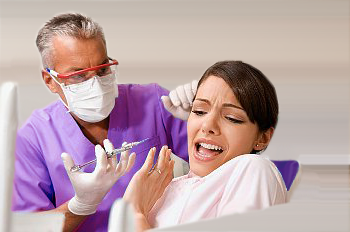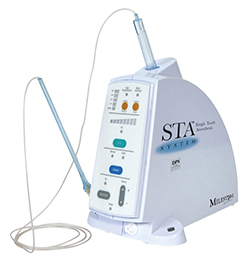DENTAL PHOBIA

There
are many reasons why a patient is afraid to go to a dentist. The
reasons could be; the dentist, embarrassment, loss of control, pain,
needle phobia, sights, sounds, smells, gagging, panicking or crying,
the drill, feeling numb, choking, unnecessary treatment, allergy
to "Novocain", cannot get numb, being awake, extensive treatment,
cost, medical settings, brushing teeth.
Many
people surely associate the dentist with painful tooth extractions
and a dentist in a white robe who is holding a roaring drill in
his hand.
Fortunately,
this belongs to the past and can in worse case be an old memory.
We offer modern treatments with anaesthesia that makes you feel
good when you are sitting in the dental chair and after the visit.
There
are many different techniques which can help people overcome their
dental phobia or fears.
Psychological
Methods for Overcoming Fears:
| |
A)
Take control!
Many people fear losing all control while in the dental chair,
and get panic as a result. If that's the case, you may want
to find a dentist who will talk to you throughout the procedure,
tell you what s/he's doing and what sensations to expect, and
explain each and every step. This will actually help you feel
in control, by understanding what is going on. |
| |
|
| |
B)
Distractions
One of the first "practical" bits of advice is to take a CD-player
along, so that you will not hear the noises associated with
various dental instruments. You may even have read about Virtual
Reality glasses which are now offered by some dental offices.
|
| |
|
| |
C)
Relaxation, Hypnosis, Self-Hypnosis and NLP |
Pharmacological Help:
|
|
A)
Anaesthesia
Anaesthesia
is divided into two head groups:
1.
Local Anaesthesia
2. General Anaesthesia
1.
Types of local anaesthesia. Depending on how the anaesthesia
is applied you can distinguish following types of anaesthesia;
Surface anaesthesia, Infiltration anaesthesia, Nerve blocks.
|
 |
| |
|
| |
Read
more about pain-free treatment >> |
| |
|
| |
Surface
anaesthesia means
that the mucosa is covered with anaesthesia by spray, gel, ointment
or lotions. This method has a weak effect and can therefore
only be used in those cases there the pain is not so big, for
example test injection, incision of an abscess under the mucosa,
extraction of a loose milk tooth. The method can also be used
to make the area there the needle shall be placed numb using
infiltration anaesthesia or nerve blocks. |
| |
|
| |
Infiltration
anaesthesia means that the tissue is impregnated with anaesthesia.
This method is effective enough for painless tooth extraction
or tooth repair. |
| |
|
| |
Nerve
blocks mean that the anaesthesia is injected between the
tooth root and the root membrane. Nerve blocks are used for
surgical tooth extractions. |
| |
|
| |
2.
Types of general anaesthesia (also called narcosis) General
anaesthesia is today very rarely used by the dentist. The risk
for complications, in spite of that they are very rarely - is
bigger.
General anaesthesia can only be applied by an anaesthesiologist.
Before the anaesthesia is applied, the patient has to be examined. |
 |
| |
|
|
| |
General
anaesthesia with intubation (inhalation anaesthesia)
This method is recommended by dentist treatments. The airway
is not blocked. The patient can breathe himself or get air by
a ventilation system. It does not take long time before the
patient is a wake.
General
intravenous anaesthesia
When the treatment can be long, and be used as a complement
to local anaesthesia. The patient is recommended to stay at
the dentist clinic a few hours after narcosis.
|
B)
Laughing gas (nitrous oxide)
Nitrous
oxide N2O is relatively harmless gas. The Laughing gas is mild anaesthetic
and is used as an anaesthetic within obstetrics and dentistry.
C)
Oral sedation
Most commonly, oral sedation (usually in the form of anti-anxiety
or "happy pills") is prescribed for relieving anxiety in the hours
immediately before a dental appointment. An anti-anxiety or sedative-hypnotic
drug (see below) taken the night or 1.5 hours before the appointment.
|



